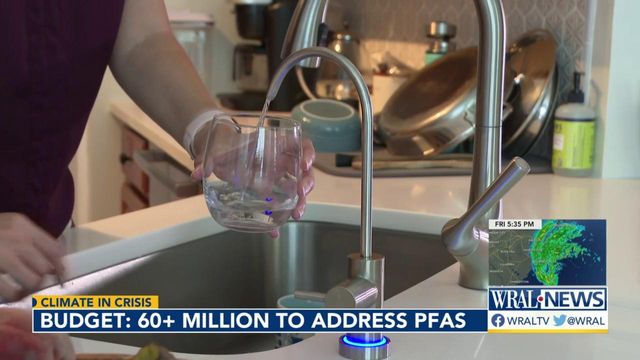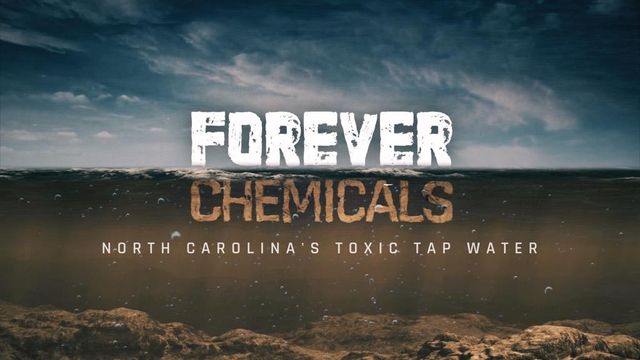NC budget contains millions to clean up PFAS, limits to emissions regulations
North Carolina's finalized budget includes more than $61 million to address substances commonly known as forever chemicals.
While many are celebrating resources to address a problem that has plagued the state for decades, some critics say the polluters — not the taxpayers — should be footing the bill.
PFAS, an acronym for per- and polyfluoroalkyl substances — the toxic forever chemicals — have been seeping into the Cape Fear River for decades, contaminating the drinking water supply for 1.5 million people. Many of those chemicals were dumped from a Chemours Co. plant in Fayetteville, formerly owned by DuPont.
"The scale of contamination is a lot more widespread than I think people realize," said Melanie Benesh, who provides provides legislative and regulatory analysis for the Washington, D.C.-based nonprofit Environmental Working Group. "We are slowly learning about the full scale of contamination in drinking water."
- 'Forever chemicals' found in central North Carolina, study finds
- Study: Dogs, horses near Fayetteville have 'forever chemicals' in their blood
- Cape Fear officials urge state to study health risks from 'forever chemicals' in drinking water
Ratepayers in Wilmington recently saw hikes in bills to fund a $43 million filter to remove PFAS from drinking water at the Sweeney treatment plant. The utility is in an ongoing lawsuit with Chemours to attempt to recoup funds.
"Our customers should not have had to pay for these new filters to remove PFAS," said Cammie Bellamy, the public information officer for the Cape Fear Public Utility Authority (CFPUA). "That responsibility should lie with the polluter and until they step up to do that or are compelled to do so, we're going to proceed with our lawsuit."
The filters are working, but many in the area who are not connected to city water are reliant on wells or community systems contaminated with the toxic chemicals.
The budget allocates $35 million to CFPUA. Bellamy says most of those funds will be used for drinking water extensions to unserved communities in the region impacted by PFAS.
"This funding in the budget allows us to look beyond those filters and see how can we serve people in New Hanover County who may be dealing with PFAS contamination in their private groundwater," Bellamy said.
The city of Burlington will get $6 million, with $500,000 specifically allocated to address PFAS contamination. Pollution there has largely come from industrial discharges by the textile industry.
"When you're funding utilities to clean up the pollution with taxpayer dollars, you really are putting a burden on the community twice," said Geoff Gisler, a program director with the Southern Environmental Law Center. "First, these people are exposed, whether it's through their drinking water or the fish they're eating, and then they're having to pay to clean it up."
The budget also earmarks $20 million to fund programs related to management of aqueous film-forming foams that contain PFAS used by local fire departments and airports.
Benesh says these foams have been a significant source of contamination in the U.S. over the past 50 years.
"When you think about firefighting foam being used in training or to put out a fire, you're releasing gallons per second, so a lot is coming out at the same time and then it's getting rinsed off and can seep into the groundwater and area rivers, contaminating the water supply," Benesh said.
PFAS chemicals have been linked to adverse health effects, including cancer.
Four million dollars will fund PFAS research projects including a human exposure study for North Carolinians in contaminated area by UNC-Chapel Hill’s Collaboratory.
Gisler says more funding should go to regulatory agencies such as the Department of Environmental Quality and stopping PFAS at the source.
"Where we really need to be putting our our efforts is in preventing exposure in the first place, rather than documenting the effects of that exposure," Gisler said.
While millions are spent on clean up and research, production of the chemicals in the state is expanding.
The budget didn't include funds specifically for addressing climate change.
There is, however, a provision forbidding the state from requiring utilities to offset their carbon emissions and one that forbids imposing emissions standards on new vehicles.
The budget also removes emissions-inspection requirements in 19 of the 20 counties in which they currently exist, with the exception of older vehicles in Mecklenburg County.
Shawn Taylor with the NC DEQ's Division of air quality says that eliminating auto emissions programs in any county would need to be cleared federally.
"North Carolina would need to develop an updated State Implementation Plan (SIP), which would have to demonstrate how the state would maintain attainment with federal air quality standards (including standards for pollutants PM2.5 and Ozone) without the inspection program in those areas," Taylor said.
The EPA would then need to approve the updated SIP.











